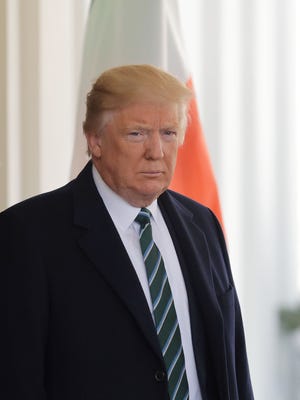Senate Intelligence Committee finds ‘no indications that Trump Tower was the subject of surveillance’

WASHINGTON — The leadership of the Senate Intelligence Committee on Thursday flatly refuted President Trump's claims that his New York offices were wiretapped by the Obama administration in advance of the November election.
“Based on the information available to us, we see no indications that Trump Tower was the subject of surveillance by any element of the United States government either before or after Election Day 2016," Chairman Richard Burr, R-N.C., and Vice Chairman Mark Warner, D-Va., said in a joint statement.
The rebuke comes a day after the House Intelligence Committee offered a similar assessment, leaving the White House virtually alone in asserting the surveillance claim.
The unusually strong, bipartisan statement left little room for the White House to continue its defense of Trump's extraordinary allegations that implied that former president Barack Obama engaged in a possible criminal act.
Later Thursday, a combative White House spokesman Sean Spicer said the president "stands by'' general contentions that the government had engaged in some type of surveillance prior to last year's election. He also maintained that the Senate and House committees made their conclusions without the input of the Justice Department. (Earlier this week, Justice officials asked for additional time to determine whether any evidence of surveillance at Trump Tower existed.)

Spicer also gave a lengthy recitation of past news reports — based on anonymous sources — as possible evidence of surveillance. Yet, Spicer acknowledged that the president himself has not directly asked government intelligence officials to provide any evidence that may support his claims that his offices were monitored in advance of the election.
"There's a ton of media reports out there that indicate that something was going on during the 2016 election," Spicer said.
Earlier this week, Rep. Devin Nunes, R-Calif., chairman of the House Intelligence panel, and California Rep. Adam Schiff, the committee's ranking Democrat, issued a strong repudiation of the wiretap claim, similar to Thursday's statement by the Senate panel.
"We don't have any evidence that that took place,'' Nunes said. "I don't think there was an actual tap of Trump Tower.''
Read more:
Fact check: Examining Trump’s wiretap claim
Justice asks for more time on Trump wiretap claim
Britain's spy agency denies wiretapping Trump, calls claims 'ridiculous'
The definitive statements from two of the most powerful congressional committees also come just days before FBI Director James Comey is scheduled to testify before the House Intelligence Committee, where he is expected to be asked about Trump's claims and the ongoing federal investigation into communications between Trump associates and Russian government officials.
The FBI director had encouraged Justice officials to publicly discredit Trump's claims shortly after they were issued March 4. Justice did not act on the request. But former Director of National Intelligence James Clapper has publicly denied that such surveillance ever occurred.
House Speaker Paul Ryan, R-Wis., also threw cold water on Trump's theory, telling reporters Thursday: "We've cleared that up; we've seen no evidence of that."
In recent days, Trump and his aides have attempted to redefine the president's claims, saying that his use of the wiretapping term covers a variety of surveillance techniques.
"Wiretapping is pretty old-fashioned stuff," Trump told Fox News' Tucker Carlson in an interview Wednesday, echoing comments his aides have made in recent days. "But that really covers surveillance and many other things."
Obama's spokesman has denied wiretapping, noting that presidents are prohibited by law from wiretapping and that such surveillance would have to be approved by a special court.
Trump's accusation, first made in a March 4 series of tweets, comes amid an investigation into whether the president or his associates had contacts with Russians involved in the effort to hack Democratic Party officials during last year's election. Trump has said he had nothing to do with Russia and described the probes as witch hunts.
In his Fox News interview, Trump said, "We will be submitting certain things and I will be perhaps speaking about this next week. But it's right now before the committee ... I have a lot of confidence in the committee."
Trump told Carlson he based his accusations on various news reports (as opposed to intelligence agencies).
In defending his expanded definition of the term wiretapping, Trump said he put term "in quotes" during his March 4 tweet-storm, and "that's a very important thing."
